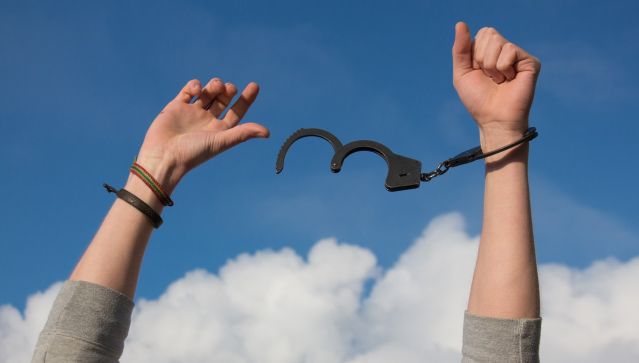Anxiety
Anxiety as the Path to Freedom
Bodily awareness of unrest is the key to embracing all of you.
Posted April 13, 2023 Reviewed by Michelle Quirk
Key points
- Our prediction that we cannot manage what taking that step would feel like stops us from living our biggest life.
- Feeling bodily sensations of vulnerability lets you take brave steps forward into all that is uncertain, new, desired, and not yet yours.
- When we can notice unrest and soothe it, we are free to feel everything.
When you think of anxiety, you don't usually think of freedom. But I'm going to share a secret: The biggest freedom you can have is the ability to feel anxiety in your body.
I know, it sounds crazy, right? But I promise you that's true.
Vulnerability Is a Powerful Tool
Some people believe the biggest freedom would be to never ever feel anxiety. But, if that were true, and you never felt the tension and agitation of your sympathetic nervous system, you would not be a truly alive and sensing human. As a matter of fact, psychopaths (those folks who have no conscience and no empathy) have remarkably low levels of anxiety, and that is not a good thing.
When people say to me they are waiting for the day they will feel no anxiety, I tell them they will experience sensations of vulnerability until the day they die. Those uncomfortable sensations are a wake-up call, inviting you to tune inward when you're faced with limits to control over things that matter to you. That activation in your nervous system, the muscle tension and agitation of "unrest," is simply your body's way of signaling you to pay inner attention and soothe your nervous system, so you can access the power of emotion flowing underneath.
Unrest is the most powerful tool we have to promote our personal growth, as long as we know what to do with it. Freedom is not being free of anxious sensations; it is being able to face, feel, and soothe them, to access the wisdom of emotion—the adaptive emotions that want to help us come to terms with reality, when reality does not bend to our will.
The key is we need to be able to notice, tolerate, and really feel what our body feels like when we are anxious. We need to stay out of the "story" we make up, all the future "what ifs" and imagined scenarios, and all the backward-looking stories of "woulda shoulda coulda." Importantly, we need to bring a precise and slow awareness to our inner experience of muscle tension and arousal. We need to carefully (with care in our hearts) stay with ourselves and sense the quality, intensity, and parameters of the tension, being willing to really feel this moment of uncertainty, this moment of "I can't," this moment of limits to control over an outcome that matters to me.
Like Sleepwalkers, We Tune Out of Ourselves
This is such a simple thing, yet it is so very hard to do. We are primed to move away from this experience of tightness and agitation. There is an urge to disconnect from what we feel at that moment. At a level that is below our conscious awareness, it just seems like the right thing to do, and we typically simply obey the impulse. Like sleepwalkers, we avoid our inner experience and tune out of ourselves. We use myriad ways to avoid: eating, drinking, shopping, busying, controlling, worrying, and distracting ourselves, slaves to an impulse we didn't even recognize.
That's where freedom comes in. When we can notice the signal from the body that tells us we are vulnerable, if we can become expert at knowing our own unique phone call (tight shoulders, fidgety fingers, held breath, clenched butt, tapping feet) as the body asks for our attention, we have a choice—the big choice that leads to freedom. We have the choice to approach ourselves then and there in that precise moment and be with ourselves in the discomfort. It is the choice of love. Or we can avoid ourselves in that moment, which is the choice of fear. And if we chose fear and avoidance, we are not free. We are busy and numb and fretful and distracted and sometimes very productive...but we are not free.
Freedom is the ability to be with ourselves in the discomfort of what is. Rather than fight with what is, rather than trying to fix it or change it or shut it down or shame it or run away from it, freedom is saying hello to what is actually happening in your life and under your skin.

Our Fear of the Feeling of Fear Is an Obstacle to Freedom
Freedom is being able to feel what we are feeling and not catastrophize it with a story, and not escape from it with a behavior, and not avoid it in all the many ways we have to leave ourselves.
At the end of the day, what stops us from living our biggest life is our prediction that we cannot manage what taking that step would feel like. It is our fear of the feeling of it. Notice that when you avoid yourself in the moment, you do not escape any real "danger." You are avoiding yourself and your life and your feelings because of a feeling, because of discomfort. Because (perhaps) when you tune in there might be emotional pain. But none of that is a threat to life or limb. It is simply the truth of being human. Life touches us and moves us, and we do not have ultimate control over that. In practicing feeling your feelings in your body, you liberate yourself to take brave steps forward into all that is uncertain, new, desired, and not yet yours. This is how we grow emotionally into all we are meant to be.
Take a breath right now and feel your inner experience of you. Open yourself to really feel what does not feel good and let yourself make the choice to stay with you. It is only a feeling, and your body needs to know you are there with it. Your attention is the medicine, letting your body know you are safe.
And then, as your body recognizes you and settles, you are free.
References
Bare, R.L., Hopko, D.R. & Armento, M.E.A. (2004). The Relation of Psychopathic Characteristics and Anxiety in Noncriminals: Physiological and Cognitive Responses to Guided Imagery. Journal of Psychopathology and Behavioral Assessment 26, 225–232.
Hu, T., Zhang, D., Wang, J., Mistry, R., Ran, G., & Wang, X. (2014). Relation between Emotion Regulation and Mental Health: A Meta-Analysis Review. Psychological Reports, 114(2), 341–362.
Parker, S. (2022). Embracing Unrest: Harness Vulnerability to Tame Anxiety and Spark Growth. Vancouver: Page Two Press.


